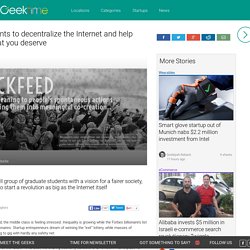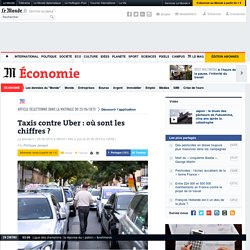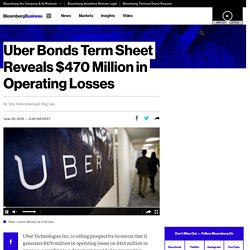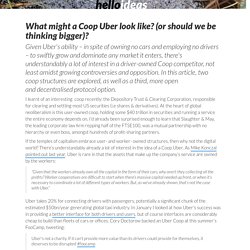

Backfeed dares to democratize the Internet. Photo credit: company website Founded by a small group of graduate students with a vision for a fairer society, this startup aims to start a revolution as big as the Internet itself All over the developed world, the middle class is feeling stressed.

Inequality is growing while the Forbes billionaire’s list fills its ranks with tech billionaires. Startup entrepreneurs dream of winning the “exit” lottery, while masses of freelancers survive from gig to gig with hardly any safety net. The sharing economy is a hot buzzword in tech circles. Platform Cooperativism. Opération coup de poing à Paris contre les locations meublées touristiques illégales - 13 janvier 2016 - Immobilier.
"Bonjour !

Nous sommes des agents de la Ville de Paris. Nous venons contrôler les meublés touristiques". Hier, pour la seconde fois en un an, des agents de la mairie sont venus frapper aux portes d'appartements situés dans le centre de la capitale pour débusquer les "professionnels" de la location de meublés touristiques type AirBnb. Arcade City: Decentralized, Blockchain-Based Answer to Uber. The city of Portsmouth, New Hampshire passed an ordinance regulating ride-sharing services that took effect in September of 2015.

The ordinance made driving with Uber and other ride-sharing companies illegal within the city limits. Sharing economy firms like Uber and Airbnb are burning cash at a phenomenal rate. An audience member at the Sharing & On Demand Economy Conference recently questioned a panel of entrepreneurs on whether people will possess anything of their own in years to come, be it their own home, their own car, their own wedding dress, or even their own power drill.

Owning things is expensive and finding places to store unnecessary luxuries in a world that’s becoming increasingly densely populated could be seen as cumbersome, according to Alex Stephany, the former CEO of drive rental platform JustPark. Entrepreneurs operating in the sharing economy, which is underpinned by the internet and the rise of smartphones, are describing their businesses as revolutionary, with Uber’s Travis Kalanick saying his taxi-hailing app is changing the way people travel across the world.
“We want transportation to be as reliable as running water everywhere for everyone,” Kalanick said at Salesforce’s annual conference in September. Show me the money UK government and the sharing economy. Rocket's Airbnb clone Wimdu burned € 16,5 million in first year. Recently, rumors surfaced that Rocket Internet is trying to sell Wimdu, its Airbnb clone, but that it can’t find any buyers for it.

According to the reports, Wimdu is struggling to find traction in a busy European market where Airbnb and HouseTrip are growing market share fast. Wimdu denied the rumors that it was being shopped around and said it was ‘very happy with its numbers’ and its future. Every player in the segment is burning huge amounts of cash (Airbnb raised $ 120 million, HouseTrip raised $ 60 million), because they are locked in a race to establish what Johannes Reck of GetYourGuide yesterday called ‘marketplace’ advantages: the player who can move the most demand and supply wins.
And because suppliers and consumers naturally want to use the largest, busiest marketplace, they keep winning once they establish their dominance beyond doubt. Thanks to the publication of the annual results of Wimdu, we now know how much money Wimdu is spending, and the answer is: a LOT. Selon Uber, l'activité de 80 000 chauffeurs indépendants serait menacée à Paris. Taxis contre Uber : où sont les chiffres ? Le Monde.fr | • Mis à jour le | Par Philippe Jacqué Jeudi 25 juin au matin, de nombreux blocages routiers étaient mis en place en France par des chauffeurs de taxi.

Les chiffres qui expliquent pourquoi Uber cartonne (quand même) Un carton.

Uber Bonds Term Sheet Reveals $470 Million in Operating Losses. Uber Technologies Inc. is telling prospective investors that it generates $470 million in operating losses on $415 million in revenue, according to a document provided to prospective investors.

The term sheet viewed by Bloomberg News, which is being used to sell $1 billion to $1.2 billion in convertible bonds, doesn’t make clear the time period for those results. The document also touts 300 percent year-over-year growth. Uber, AirBnB & Cie, l’économie collaborative nous a été volée – Interview. Plus personne n’est dupe.

Une part de l’économie collaborative est aujourd’hui gangrénée par des entreprises tentaculaires qui capitalisent sur la bonne volonté des citoyens. Des voix s’élèvent pour dénoncer cette spoliation et proposer une nécessaire réflexion à l’émergence d’alternatives vraiment collaboratives. Rencontre avec Matthieu Lietaert, auteur du livre ‘Homo Coopérans 2.0 – changeons de cap vers l’économie collaborative‘. Can we build a humane alternative to Uber? What might a Coop Uber look like? (or should we be thinking bigger)? Given Uber's ability – in spite of owning no cars and employing no drivers – to swiftly grow and dominate any market it enters, there's understandably a lot of interest in a driver-owned Coop competitor, not least amidst growing controversies and opposition.

What If Uber Were a Unionized, Worker-Owned Co-Op? These Denver Cabbies Are Making It Happen by Mary Hansen. Wolde Gebremariam is one of more than 160,000 people nationwide who drive their own cars for Uber. Based in Denver, Gebremariam, age 28, drives his Chevy SUV for the company and occasionally works as a private limo driver. “The labor movement has to bring ownership and equity into the picture.” Uber built its $40 billion business around a mobile-based application that connects drivers with riders. Hailed by some for shaking up a stagnant taxi industry, others criticize the company for how it treats drivers, who pay for their own cars, gas, and maintenance.
It’s also been criticized for dictating rates and for deactivating drivers’ accounts, essentially firing them, without warning. The ride-hailing app company may be innovative from the perspective of its customers—and its owners—but for the driver the experience is very similar to that of a traditional taxi driver, as Gebremariam can attest. Platform Cooperativism vs. the Sharing Economy.
The backlash against unethical labor practices in the “collaborative sharing economy” has been overplayed. Recently, The Washington Post, New York Times and others started to rail against online labor brokerages like Taskrabbit, Handy, and Uber because of an utter lack of concern for their workers. At the recent Digital Labor conference, my colleague McKenzie Wark proposed that the modes of production that we appear to be entering are not quite capitalism as classically described.